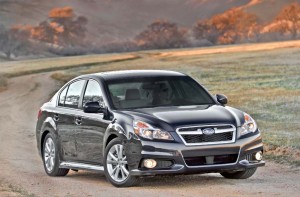
Subaru will downplay China and focus on North America, possibly expanding the Indiana plant building vehicles like the Legacy.
Even as – and perhaps because – much of the rest of the auto industry rapidly ramps up production in China Subaru has decided to scale back its ambitions for the booming Asian market.
With the automotive subsidiary of Fuji Heavy Industries now delaying plans for a Chinese plant it will scale up its presence in the key North American market, reports Automotive News, possibly even with a second assembly plant.
“We will prioritize expanding production in America while we watch the situation in China and consider what to do there when there are some developments,” Fuji President Yasuyuki Yoshinaga told the trade publication.
Subaru is a relative latecomer to the Chinese market, something that might not have been a problem until recently. But that country’s automotive market has entered into an unexpected slowdown worsened by an overall cooling of the Chinese economy. Meanwhile, major automakers, such as General Motors, Volkswagen and Nissan, are already battling it out in China raising concerns about the chances of a newcomer like Subaru.
Fuji is now backing away from plans to build a car plant in China that it announced just 10 months ago and during a meeting in Japan, Yoshinaga outlined a new strategy that puts the emphasis back on Subaru’s biggest external market, North America.
The maker currently operates a plant in Indiana that was originally built as part of a joint venture with Japanese maker Isuzu, which later abandoned the U.S. Today, Subaru assembles a variety of products there and also uses some excess capacity to assist Toyota which owns a stake in Fuji.
But Subaru sales in the U.S., in particular, have been routinely outpacing the overall automotive recovery – the maker being the only car brand to increase sales during the worst of the recent recession. It is currently on pace to set yet another record this year of 324,000, which would be a 16% jump from 2011 sales.
At the Fuji annual earnings event the maker revised its forecasts and now expects to sell 380,000 vehicles in the States by 2016, up from an early 350,000. For all of North America it now foresees sales of 410,000 vehicles annually.
As with its Japanese competitors, Subaru is looking to avoid the impact of the strong yen and is depending upon its North American plant – which it could expand to meet its growth forecast. An alternative, the maker said, would be to add another plant.
Fuji officials said they have not entirely abandoned China, and still sees a goal of selling 100,000 vehicles there by 2016, down from an earlier goal of 180,000. But with Chinese authorities unwilling to approve a plant the maker will now focus exclusively on imports.
